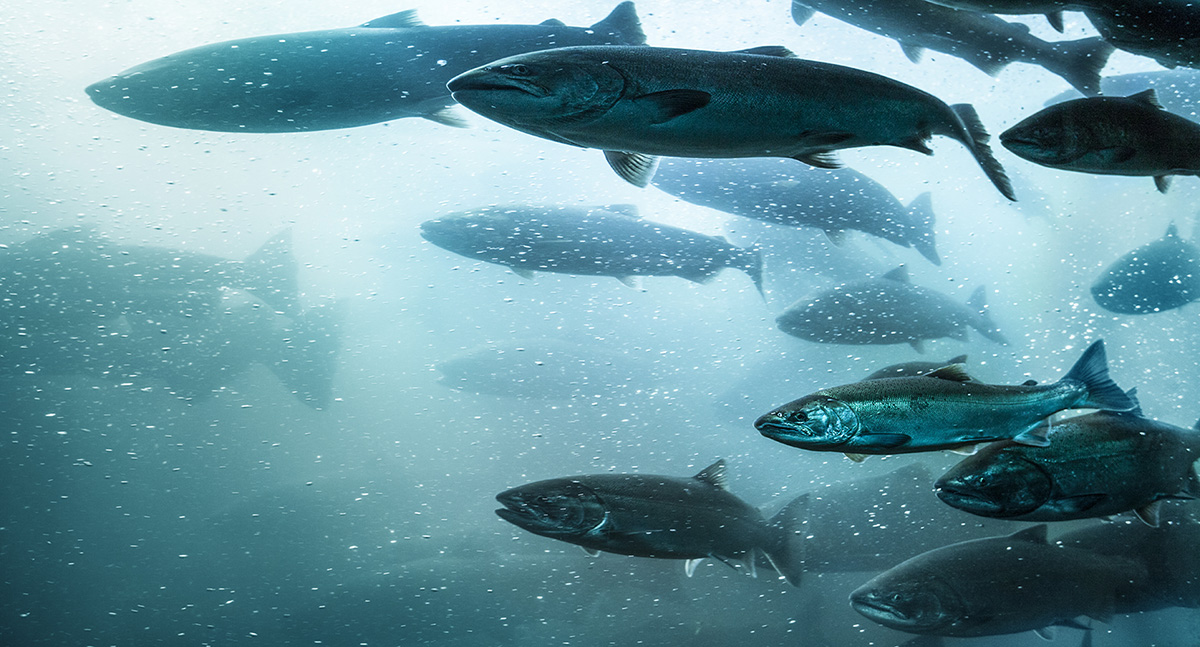Recently, the UK Agri-Tech Centre launched a comprehensive report on livestock and aquaculture, outlining key recommendations for shaping the next 10 years of these vital sectors. The report highlights research priorities aimed at improving sustainability, productivity and resilience.
As Aquaculture Innovation Lead at the UK Agri-Tech Centre and with his broad knowledge of the UK sector, Martin Sutcliffe builds on this with reflections on the state of the aquaculture industry, where it stands today and how it must evolve to meet future challenges.
I’ll discuss opportunities and the pressing issues we need to address if we’re to see meaningful, sustainable growth in the sector.
Aquaculture is an extremely diverse sector, involving the breeding, rearing and harvesting of fish, shellfish, aquatic plants and algae and can serve as an alternative to traditional fisheries. It is a vital component of the global food system, especially with increasing demand for sustainable protein sources.
With capture fisheries facing a decline and increasing pressure from challenges such as overfishing, habitat degradation and the effects of climate change, farmed aquatic food can help bridge some food security gaps. However, scaling aquaculture to meet global demand while gaining social license and minimising environmental and ethical concerns is a significant challenge.
In recent years, the sector has witnessed advancements in sustainability and technological innovation, but there are challenges that must be navigated for aquaculture to truly fulfil its potential. In this article, I’ll examine the key developments shaping the future of aquaculture, the sustainability challenges the industry faces and the technological innovations driving progress.

Balancing sustainability with growth
The issue of sustainability is central to any conversation about the future of aquaculture. This is an industry that has the potential to meet global food demand while maintaining environmental and social responsibility.
The challenges are significant: water use, waste management and the impact on local ecosystems are all areas where aquaculture must tread carefully. Further up the supply chain, the source of feed ingredients and the potential for land use change are of concern. Addressing these matters is essential to ensure that aquaculture’s growth does not come at the expense of the planet.
Encouragingly, many in the sector are adopting sustainable practices to mitigate these impacts and across aquaculture in general there is a desire to adopt change. Take integrated multi-trophic aquaculture (IMTA) for example, where different species, such as fish, shellfish and algae, are farmed together.
This method reduces waste and improves overall ecosystem health by using the by-products of one species to support the growth of another. While this approach has shown promise, achieving a balance between maximising production and conserving the environment remains a complex task and has yet to be proven beyond small scale farms, which are not commercially viable. Yet for IMTA farms to realise some of the early promise, tweaks to the regulatory landscape are needed, allowing farmers to grow different species in proximity.
The next decade will likely be pivotal as the industry works to scale up sustainably. The focus must shift towards solutions that not only boost production but also protect biodiversity and habitat integrity – finding the right balance between these two forces will be critical.
Success will depend on a careful alignment of business goals with environmental stewardship, ensuring that aquaculture contributes to a more resilient and sustainable global food system. It’s not enough to say that we’ll produce more food to feed a growing population – we must produce more in a way that doesn’t contribute to the problems we’re trying to solve, including increasing farming efficiency and moving toward a truly circular system.
Technological innovations as drivers of efficiency
Technological advancements are starting to reshape aquaculture, helping the industry improve productivity while addressing sustainability challenges. Automation, artificial intelligence (AI) and biotechnology are among the innovations reshaping the sector, enabling more efficient, environmentally friendly practices.
Artificial intelligence (AI) and automation are at the forefront of this shift. For instance, AI-driven systems can now monitor water quality, fish health, and feeding patterns in real time, allowing for real-time tracking, helping to prevent disease outbreaks and optimising feeding schedules. This not only improves the welfare of the fish but also leads to greater efficiency, reducing waste and improving overall productivity.
Then there’s biotechnology, another area with immense potential. Genetic modifications and selective breeding techniques are being developed to produce fish that are more resistant to disease and grow more rapidly, reducing the need for antibiotics and other treatments. Moreover, advancements in sustainable feed, such as insect-based protein, are helping to reduce the environmental impact of traditional fishmeal, which relies heavily on wild-caught fish.
And it’s not just about the tech we have now – there are some pretty exciting developments on the horizon. Offshore farming, for instance, where farms are located in deeper, less ecologically sensitive waters, could help reduce the pressure on coastal environments. By moving operations further offshore into deeper waters, aquaculture could reduce its environmental footprint while tapping into new opportunities for growth.
Regulation, fish welfare and future trends
Despite the promising developments in sustainability and technology, the aquaculture sector faces significant regulation, demand and ethical challenges. In many regions, the regulatory framework is struggling to keep pace with the rapid expansion of the industry. International cooperation and stronger policies are needed to ensure the industry grows sustainably, particularly in relation to environmental protection and animal welfare.
Here in the UK, the aquaculture sector holds immense potential for sustainable food production. However, a key factor limiting its growth is the lack of strong consumer demand for certain aquaculture-based products. Unlike more popular farmed fish including salmon, products such as mussels, oysters, and other shellfish have struggled to gain widespread market appeal.
These products are often perceived as niche or luxury items rather than everyday protein sources, which hinders their ability to drive significant industry expansion. For aquaculture to truly flourish, consumer preferences need to shift, embracing a broader range of farmed seafood products. Without this demand, the sector’s ability to scale sustainably and profitably remains constrained.
Fish health and welfare are increasingly important topics within the industry. Recent research has been eye-opening in terms of what fish need to thrive, including healthy, low-stress environments.
Disease prevention is obviously a major concern, but we’re also learning a lot more about the kind of conditions that lead to better welfare outcomes. Biosecurity measures, better water management, and the use of vaccines are all playing a role in improving fish health, and this is an area that will only grow in importance as the industry expands.
Further research is essential to fully understand the long-term environmental and social impacts of aquaculture, particularly as new technologies and farming methods are introduced. Continued investment in research and development will be key to ensuring the industry’s future growth is both sustainable and ethical.
A sustainable future for aquaculture
Aquaculture is at a critical juncture. The potential is huge – this industry could be key to feeding a growing population in a sustainable way. But there are significant hurdles to overcome, from ensuring environmental protection to improving fish welfare and navigating complex regulatory frameworks. Sustainability must be prioritised, and technological and biological innovation harnessed to ensure that growth does not come at the expense of the environment or animal welfare.
The good news is that we’ve already started down the right path. I’m a big believer in working together to solve challenges and with the right mix of innovation, smart policy and a commitment to sustainability, aquaculture can – and will – play a major role in the future of UK food production.
